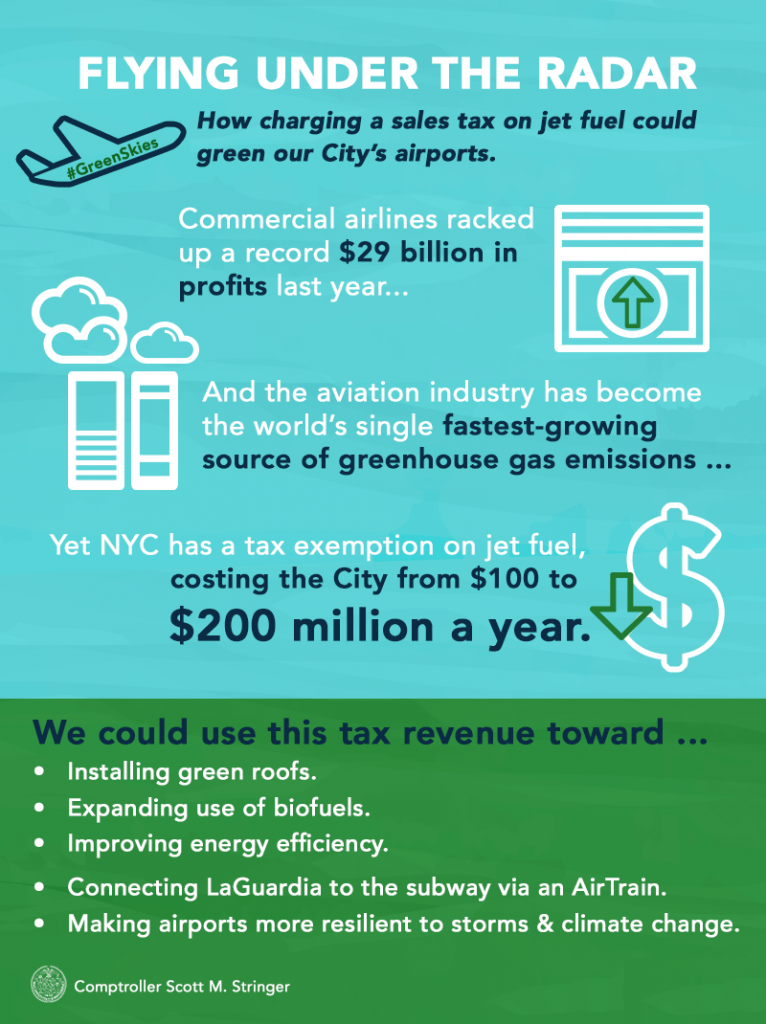Comptroller Stringer: Airlines Flying Off With Hundreds Of Millions In Tax Breaks On Jet Fuel

City should end tax giveaway and make big airlines pay city sales tax on fuel, just like drivers at the pump Funds could help to green and modernize NYC's airports, including new rail link to LaGuardia
(New York, NY) – On Earth Day, New York City Comptroller Scott M. Stringer blasted a tax giveaway that allows airlines at LaGuardia and John F. Kennedy airports to avoid paying city sales tax on airline fuel – an exemption that costs the City anywhere between $100 and $200 million a year – revenue which could be used to modernize and green local airports, now consistently ranked among the worst in the country. These findings are contained in a new report released today by Comptroller Stringer: “Green Skies Ahead: A Plan to Modernize and Green New York City’s Airports.”
“U.S. airlines have been flying for free when it comes to paying a sales tax on jet fuel at local airports, and it’s time to make them pay their fair share,” Comptroller Stringer said. “Ending this giveaway would help New York City and the Port Authority secure the funds they need to modernize and green our airports, helping cut down on soaring emissions from the aviation industry.”
Unlike millions of New Yorkers who pay the city’s 4.5 percent sales tax every time they fill up at the pump, U.S. airlines pay no sales tax in New York on jet fuel – even though the price of fuel has hit a 12-year low, and carriers racked up a record $29 billion in profits last year. In 2012, the size of the sales tax exemption amounted to $227 million. However, the total value of the exemption will fluctuate in line with the cost of jet fuel; today the exemption would yield approximately $100 million, given the reduced cost of fuel.
Comptroller Stringer noted that a tax on jet fuel would create a new funding stream to help support Governor Andrew Cuomo’s $5 billion project to upgrade LaGuardia. The Governor’s blueprint includes an ambitious proposal to connect LaGuardia to the City’s public transit network that could have a transformative impact on reducing the number of passengers arriving and leaving LaGuardia by private car. As it is, more than 80 percent of passengers use a private car or taxi to get to LaGuardia, an airport Vice President Joe Biden once likened to those found in “a third world country.”
This giveaway is particularly concerning at a time when our City’s airports rank among the worst in the nation for customer satisfaction, delays, and mass transit accessibility. One recent study ranked JFK and LaGuardia last and third-to-last, respectively, in mass transit accessibility among 30 comparable international airports.
In addition, the global aviation industry has become the world’s single fastest-growing source of greenhouse gas emissions. Comptroller Stringer’s report notes that the U.S. Environmental Protection Agency recently declared that greenhouse gas emissions from commercial airlines contribute to global warming and must be regulated under the Clean Air Act.
In response, Comptroller Stringer called for legislation granting New York City the option of levying a tax on the sale of jet fuel and proposed a menu of airport-related improvements that could be funded by such revenues, including:
- Connecting LaGuardia to the subway via an Air Train. The Governor’s new AirTrain would connect passengers to the 7 subway line and the Long Island Rail Road at Willets Point. Since the construction of JFK’s AirTrain, ridership has grown almost 250% percent.
- Installing green roofs. Airports around the world, including major terminals in Frankfurt, Chicago, and Amsterdam, are topped with green roofs which help reduce energy costs, limit run-off, and absorb carbon.
- Improving energy efficiency. New York should seek to transform its airports into best-in-class facilities that meet the highest standards of energy efficiency.
- Making airports more resilient to storms and climate change. Adding shoreline defenses can help defend against rising tides and a heightened risk of coastal flooding.
- Expanding use of biofuels. To reduce environmental impacts of airports, New York should build on a 2013 pilot project which powered international flights with sustainable, low-emission biofuels.
“There’s no good reason why airlines should be exempt from a tax that the rest of us pay every day, whether we are buying a sandwich or filling up at the pump,” Stringer said. “By levying City sales tax on jet fuel, our City can invest in transforming our airports into models of sustainability that can help mitigate the enormous carbon footprint of air travel.”
To read the full report, click here.
###
###